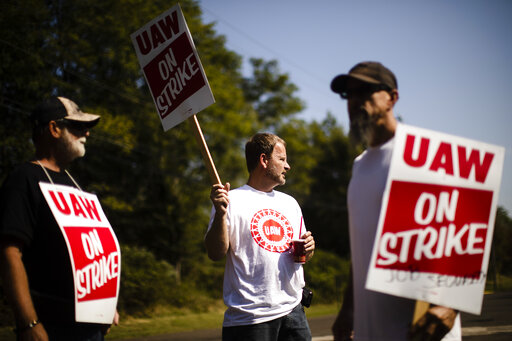By Anna Zimmermann | UConn Journalism
December 11, 2023

Joe Lunghamer, President of Joe Lunghamer Chevrolet, in December 2023 joined the rest of Detroit in their collective sigh of relief as the looming uncertainty dissipates from his showroom in Oakland County, Michigan.
Following the conclusion of the United Auto Workers strike, spirits in Detroit are high. With the holiday season just ahead, a $1,500 bonus for UAW members, and the threat of possible worsening economic turmoil has vanished, the people of southeast Michigan are relieved that the strike has been ratified.
Tensions were high amid the strike. In Michigan where 20% of the workforce is in the automotive industry according to the Detroit Regional Chamber, dealers, such as Molly Williams, the Chief Operating Officer of Matick Automotive Group, agree that it can be challenging navigating customer and even employee relationships. She explains how the employees are also customers and possible UAW members or supporters. This makes staying as neutral and unbiased as possible when explaining why it may take longer for their vehicle to be repaired extraordinarily important.
According to MarkLines, the Automotive Industry Portal, GM saw a 7% decline in sales and Stellantis saw an 11.5% decline in sales for October. Williams speculates a possible reason that buyers held off was because of the uncertainty in the market as well as the UAW customers who were only living off the $500 union pension per week and needing to save.
With what Anderson Economic Group estimates is a total of $10.4 billion in overall economic losses from the strike that began on September 15, there was an expectation that Detroit auto dealers were hit hard. The economic losses include lost wages to workers, lost earnings for the Big Three, also known as GM, Ford, and Stellantis, lost supplier wages and earnings, and business loss between dealers and customers. AEG estimates that there were over $2 million in economic losses just from the dealers, customers, and other miscellaneous industry losses.
When discussing the decline in inventory, Williams notes that there was not a decline in vehicles. She explains that this is because the union was mostly on strike at parts stocking centers and did not strike plants making vehicles until the end of the strike. However, she says that she saw about a 20% decline in inventory, mainly regarding parts; “For parts, we saw a big decline. Each day we would order parts and would not get them for 60 days,” she said.
Despite being in the heart of Motor City where the automotive industry is at the pulse of the city’s economic success, the ramifications of this strike did not take out Detroit’s GM auto dealers as it had during the 2019 strike.
According to Lunghamer, during the 2019 UAW strike, dealership parking lots sat empty, there was no inventory, parts were on hold for months, and customers sat on the sidelines. Unprepared for the impact of the strike, it was difficult for car dealers to recover. However, this time around Lunghamer describes it as being “a lot more business as usual”.
While the impacts of the 2019 strike were detrimental to car dealers all over the country, a strike would never go on long enough to shut down dealerships. Williams explains that the strike would either be solved, or the government would get involved before it would ever reach that point. She notes that fixing people’s cars, as well as emergency vehicles is a big deal and the government would mandate workers to get them basic things to continue to stay operational, even if they couldn’t get new vehicles.
“Each strike is different. Each strategy from the UAW to the Big Three is different. They strike to get what they need but also not to debilitate the business. It is so interesting how both sides prepare to create as little downtime as possible but allow public posturing to get the best deal possible,” said Williams.
Lunghamer explained how it was almost “strange” how normal things felt in Detroit during the strike after how detrimental it had been in 2019. However, Williams explains how being located in Detroit gave them a leg up this time, saying if she could be anywhere else during the strike “I’d rather be here.”
Williams says that being in Detroit, surrounded by the automotive industry and in close proximity to the Big Three headquarters, allowed auto dealers in the area, including her own, to have access to information before anyone else in the country knew about it.
“It was easier for us. We had greater knowledge and insight. We had access to information that others weren’t getting. So once we were in it, we had way better intel… We had been prepping for six months” says Williams. She explains that all of this wasn’t necessarily information directly from headquarters, but from the community around her such as her neighbors, colleagues, and friends.
Because Detroit auto dealers were aware that the UAW might go on strike before most, they were able to stock parts in preparation. Williams explains, “We ran a report, tried to figure out what we had a lot of, and ordered it so that we would have stock of it if they did this. Because they’ve done it in the past”.
“It’s really a local story. We’re all a family. Wherever you go in the world, the car business is just the car business… except Detroit,” said the CEO of Matick Automotive, Karl Zimmermann.
The automotive culture in Detroit is unlike anywhere else in the world. It’s your neighbors, your co-workers, your customers, and your family. And if you’re in Molly or Joe’s position it’s what prepared you, because that’s what family does.
